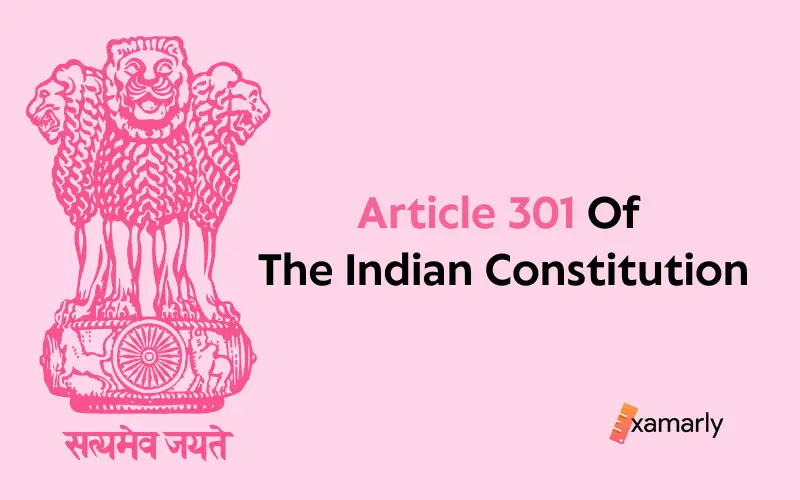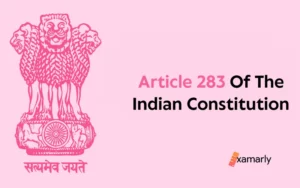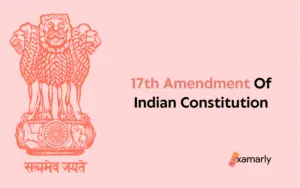Freedom of business and association is guaranteed under Article 301 of the Indian Constitution.
Before digging deep into Article 301 of the Indian Constitution, let us first focus on some pivotal points in the context of Article 301.
- What is a Trade?
- What is Commerce?
- What is Intercourse?
- Article 301 of the Indian Constitution – In Detail
- Restrictions on Trade, Commerce, and Intercourse Among States
- Summing Up
- FAQs on Article 301 of the Indian Constitution
- What is the main law that regulates freedom of trade in India?
- Can the government restrict trade and commerce in India?
- Can the government discriminate against certain types of trade or commerce in India?
- Can foreign companies engage in trade and commerce in India?
- Is there any limitation on the freedom of trade and commerce in India?
What is a Trade?
“Trade” refers to the purchasing and selling of products for commercial gain. In Article 301, “trade” refers to a real, planned, and structured activity with an explicit goal in mind. In the context of Article 301, “trade” and “business” mean the same thing.
What is Commerce?
Under Article 301, what is important for business is transportation or transmission, not gain or profit. This includes the transfer of information through the air, water, telephone, telegraph, or any other media.
What is Intercourse?
It refers to the process of transporting something from one location to another. All kinds of transactions, commercial and otherwise, are included.
It would include going somewhere and interacting with other people. The freedom allowed in Article 301 is often used as an example, however, others contend that it does not include intercourse in its fullest sense.
This is due to two factors.
First of all, since it is followed by the phrases “trade” and “commerce,” the word “intercourse” in this context will signify “commercial intercourse” rather than aimless wandering.
Secondly, although Article 301 limits the power of the Legislature and Parliament (granted to them under Article 245 and Article 246), the word “intercourse” is not listed as a subject of legislation under the Seventh Schedule (as the words “trade” and “commerce” are), so it cannot be implied to have the broadest possible meaning in this context.
The term “free” in Article 301 does not imply an absence of compliance with national laws and regulations. There is a substantial difference between laws that restrict individual liberty and those that establish standard procedures for the efficient operation of commercial enterprises.
Article 301 of the Indian Constitution – In Detail
“Subject to the other provisions of this Part, trade, commerce and intercourse throughout the territory of India shall be free.”
Article 301 of the Indian Constitution is part of Part XIII of the Constitution, which deals with “Trade and Commerce Within the Territory of India.”
It is meant to ensure that there are no barriers to the free flow of trade and commerce within India and that the government cannot discriminate against or in favor of any particular trade or commerce.
Article 301 of the Indian Constitution also gives the government the power to impose reasonable restrictions on trade and commerce to protect the general public’s interests.
However, there are still some restrictions and provisions that are associated with trade, commerce, and intercourse in India.
Let us have a look at them.
Restrictions on Trade, Commerce, and Intercourse Among States
Under clause two of Article 304, states are allowed to limit the free flow of trade, commerce, and other forms of interaction among their citizens if doing so is deemed to be in the public interest. However, without the consent of the President, no such Bill or Amendment may be introduced in the State Legislature.
Accordingly, the following requirements must be met by any state statute that seeks to regulate commerce between states:
The President’s prior consent is required, and the limitation must be reasonable and serve the public interest.
Under these terms, it is abundantly evident that the Parliament has more authority than the State to control the commercial sector.
Summing Up
In conclusion, Article 301 of the Indian Constitution protects the right to freely engage in trade, commerce, and other forms of interaction inside India’s borders.
The government is barred from putting any limitations on commercial activity. However, the state has the right to place reasonable constraints on commercial activity in order to safeguard the public interest.
FAQs on Article 301 of the Indian Constitution
What is the main law that regulates freedom of trade in India?
The main law that regulates freedom of trade in India is Article 301 of the Constitution of India. This article guarantees the freedom of trade, commerce, and intercourse within the territory of India, subject to reasonable restrictions that may be imposed by the government for the protection of the general public.
Can the government restrict trade and commerce in India?
Yes, the government can impose reasonable restrictions on trade and commerce in India to protect the general public’s interests. These restrictions must be necessary and must not be discriminatory.
Can the government discriminate against certain types of trade or commerce in India?
No, the government is not allowed to discriminate against or in favor of any particular trade or commerce in India. Article 301 of the Constitution prohibits the government from imposing any barriers or discriminatory restrictions on trade and commerce.
Can foreign companies engage in trade and commerce in India?
Yes, foreign companies are allowed to engage in trade and commerce in India. However, they must comply with all relevant laws and regulations, including taxation, imports and exports, and business operations.
Is there any limitation on the freedom of trade and commerce in India?
Yes, the freedom of trade and commerce in India is subject to reasonable restrictions that may be imposed by the government for the protection of the general public. These restrictions must be necessary and must not be discriminatory. Additionally, foreign companies must comply with all relevant laws and regulations when engaging in trade and commerce in India.






